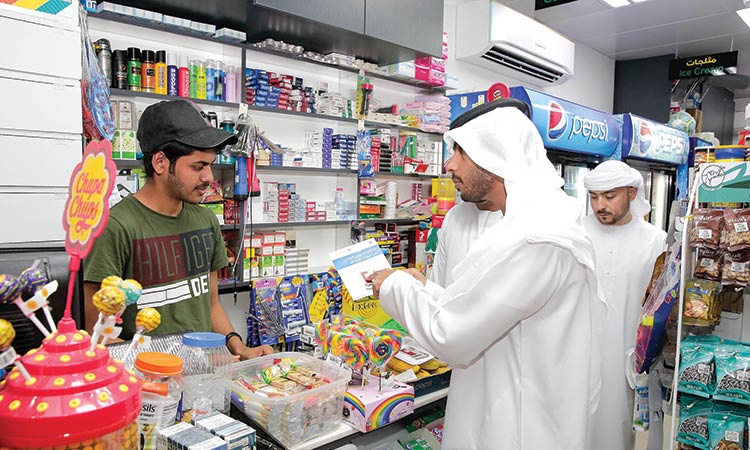Global stock markets struggle as hopes for quick rebound fade

Shoppers queue up to enter a Home Depot store in Colombia on Friday. Associated Press
After losses in much of Asia, European stocks traded lower. France’s CAC 40 dropped 0.4% to 4,433, while Germany’s DAX fell 0.4% to 10,467. Britain’s FTSE 100 shed 0.5% to 5,799.
Wall Street appeared poised for small gains, however, with the futures for the Dow industrials and the S&P 500 both up 0.8%.
Market sentiment appears fragile as attention shifts to the economic damage the world is likely to suffer because of the pandemic, says Prakash Sakpal and Nicholas Mapa, economists at ING.
A report from the Financial Times that said an antiviral drug failed to improve conditions in patients in a Chinese clinical trial cast a shadow over hopes it might turn out to be a potential treatment for coronavirus patients.
The report cited documents published accidentally by the World Health Organization. Researchers said the sample size was too small to draw scientifically valid conclusions and the trial ended early. The Foster City, Calif.-based company behind the drug, Gilead Sciences, said the data represented “inappropriate characterizations” of the China study. “Investors will continue to be monitoring developments on the COVID-19 front with a setback on clinical testing for a treatment to the virus,” they said in a commentary.
Market players are also focusing on upcoming policy meetings at the Bank of Japan, the Federal Reserve and the European Central Bank for signs of what they may say about the state of global economies that appear on the brink of collapse. The US and EU on Thursday approved economic relief packages worth about $500 billion each.
Japan’s benchmark Nikkei 225 slipped 0.9% to finish at 19,262.00. South Korea’s Kospi lost 1.3% to 1,889.01, while Australia’s S&P/ASX 200 climbed 0.5% to 5,242.60. Hong Kong’s Hang Seng fell 0.6% to 23,831.33, while the Shanghai Composite lost 1.1% to 2,808.53.
In India, the Sensex lost 0.5% to 31,689.62. Shares fell in Taiwan and Southeast Asia.
The price of oil continued a recovery from a massive crash earlier this week. U.S. benchmark crude rose 41 cents to $16.91 a barrel in electronic trading on the New York Mercantile Exchange. It rose 19.7% to settle at $16.50 a barrel. It has recovered after falling below $12 Monday, though it remains well below the roughly $60 level where it began the year.
Brent crude, the international standard, gained 66 cents to $25.45 a barrel.
Gold edged higher on Friday and was on track for a strong weekly rise, driven by central bank stimulus measures and investor appetite for a safe haven as fears mount over the economic damage caused by the novel coronavirus.
Spot Gold was up 0.1% at $1,732.69 per ounce by 1002 GMT, holding near a more than one-week high hit the precious session. Over the week, bullion has gained more than 2.7%. U.S. Gold futures gained 0.4% to $1,758.20 an ounce.
Gold is holding up well and it’s not surprising given the continuing volatility in other markets and people looking for safe havens,” Commerzbank analyst Eugen Weinberg said. “In euro terms, Gold has risen to an all-time high, which is definitely yet another proof of the continuing safe-haven demand and decreasing trust in central bank money.”
European shares fell in response to fears of a severe and lasting economic hit from the pandemic after a report raised doubts about progress in developing a treatment for COVID-19. More than 2.7 million people have been reported to be infected by the virus globally. Central banks have adopted massive monetary measures to limit the economic damage as most countries extend lockdowns to curtail its spread.
The U.S. House of Representatives overwhelmingly approved a $484 billion coronavirus relief bill, while European Union leaders approved an immediate rescue package of about 500 billion euros.
Gold tends to benefit from widespread stimulus measures from central banks because it is widely viewed as a hedge against inflation and currency debasement. “In this new world in which both the European Central Bank and the U.S. Federal Reserve continue to unleash new stimulus packages, dramatically increasing the liquidity of cash, combined with a lot of uncertainty, Gold will remain in high demand and play a key role in any investor’s portfolio,” ActivTrades chief analyst Carlo Alberto De Casa said in a note.
“Technically the trend remains bullish and a climb above $1,730 would open space for the price to test $1,747 again, with a good chance of a new high being recorded for this haven asset.” Holdings of the world’s largest Gold-backed exchange-traded fund, SPDR Gold Trust , rose to a near seven-year high. Elsewhere, palladium climbed 1.3% to $2,005.82 an ounce, but was on track to post its fourth straight weekly decline.
Agencies







